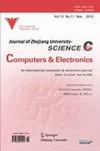Volterra filter modeling of a nonlinear discrete-time system based on a ranked differential evolution algorithm
Journal of Zhejiang University-Science C-Computers & Electronics
Pub Date : 2014-08-01
DOI:10.1631/jzus.C1300350
引用次数: 5
Abstract
This paper presents a ranked differential evolution (RDE) algorithm for solving the identification problem of non-linear discrete-time systems based on a Volterra filter model. In the improved method, a scale factor, generated by combining a sine function and randomness, effectively keeps a balance between the global search and the local search. Also, the mutation operation is modified after ranking all candidate solutions of the population to help avoid the occurrence of premature convergence. Finally, two examples including a highly nonlinear discrete-time rational system and a real heat exchanger are used to evaluate the performance of the RDE algorithm and five other approaches. Numerical experiments and comparisons demonstrate that the RDE algorithm performs better than the other approaches in most cases.基于分级差分进化算法的非线性离散系统Volterra滤波建模
提出了一种基于Volterra滤波模型求解非线性离散系统辨识问题的分级差分进化算法。在改进的方法中,将正弦函数与随机性相结合产生尺度因子,有效地保持了全局搜索与局部搜索之间的平衡。同时,在对种群的所有候选解进行排序后,对突变操作进行修改,以避免过早收敛的发生。最后,以一个高度非线性离散有理系统和一个实际换热器为例,对RDE算法和其他五种方法的性能进行了评价。数值实验和比较表明,RDE算法在大多数情况下都优于其他方法。
本文章由计算机程序翻译,如有差异,请以英文原文为准。
求助全文
约1分钟内获得全文
求助全文
来源期刊
自引率
0.00%
发文量
0
审稿时长
2.66667 months

 求助内容:
求助内容: 应助结果提醒方式:
应助结果提醒方式:


